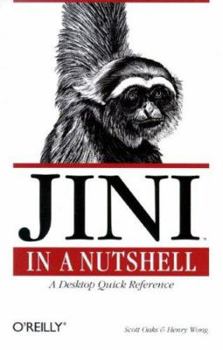Jini in a Nutshell: A Desktop Quick Reference
Jini is a simple set of Java Classes and services that allows devices (e.g., printers) and services (e.g., printing) to access each other seamlessly, adapt to a continually changing environment, and... This description may be from another edition of this product.
Format:Paperback
Language:English
ISBN:1565927591
ISBN13:9781565927599
Release Date:March 2000
Publisher:O'Reilly Media
Length:413 Pages
Weight:1.25 lbs.
Dimensions:0.8" x 6.0" x 9.0"
Customer Reviews
4 ratings
The format doesn't really suit the topic
Published by Thriftbooks.com User , 20 years ago
You know what you are getting with the typical O'Reilly "Nutshell" book, and this one is no exception. It's about half tutorial/introduction and half API/service reference and (just about) small enough to carry around. Just the facts, Ma'am This edition covers Jini 1.0 in detail, with a glance at some of the 1.1 features. Don't let that worry you, though - Jini 1.1 and 1.2 only add a few new classes, services and tools, and a full understanding of Jini 1.0 is still vital. The introductory text is concise, and doesn't offer much by way of insight or experience. The examples in the tutorial are minimal and don't quite give enough information on installing and running the full set of services, but they cover enough of the API to be useful in almost all cases.If you need an API/service/tool reference for Jini 1.0, or a handy set of code snippets to solve your immediate head-scratchers, this is great. If you want to learn and understand Jini in depth or track the very latest API changes, you are better off with (for example) "Core Jini".
Not bad , not for beginners
Published by Thriftbooks.com User , 22 years ago
This book is really not bad. It explains Jini in a straight forward manner, and is very useful for one that starts to learn Jini. It might be hard to understand for someone that knows Java and has no experiences in distributed objects, but don't blame the authors, distributed objects is not an easy topic. If it is the first touch to distributed objects, this book is NOT for you.This book is not sufficiently self-contained , readers should at least read the Jini specification to understand what the authors of this book try to explain. Remember, this is a Nutshell book: It is more compact and economically correct..;-). If you have experiences in distributed objects, I think other book that you need to read is the specification of Jini itself.
Good mix of tutorial and reference
Published by Thriftbooks.com User , 24 years ago
Written in the Nutshell style of one-half tutorial, one-half reference, this is arguably a better buy than "Core Jini" if only because the latter is an 800-page gorilla that you'll never finish. "Nutshell" is a little more practical -- its early chapter on configuring the Jini neccessities (rmid, reggie, mahalo, etc.) is stronger, especially if you prefer to work with command-lines than trivial GUI's, as I would imagine most server-side types would.An early chapter on RMI seems like a throwaway, except it has some handy information somehow missed from the corresponding "Java Enterprise in a Nutshell", notably the trick about forcing your own serialVersionUID when you make a trivial change to a class and don't want to break existing installations.I'm also impressed with the imagination in its introduction, showing how Jini could be set up to provide printing services to clients that know nothing of the devices on the network, don't have drivers, etc. While JavaSoft foolishly hypes internet toasters, this kind of hypothetical case study gets developers interested!The second half of the book is the typical Nutshell compendium of classes and methods. Arguably, you already have this in the dev kit, but sometimes it's more convenient to just double check a book than to pop out your browser.The book tries to accomodate the changes coming in Jini 1.1 (currently in alpha), and while we can't predict what Sun has up its sleeve, the most significant changes only involve moving some packages around -- nothing that can't be fixed by just changing your "import" statements and doing a re-compile. Thus, I don't think this book will be obsoleted by 1.1.Important note: Jini is a fairly advanced topic. I think there's a basic assumption in this book that the reader is a strong Java programmer and has had at least some exposure to RMI, Beans (particularly the event model) and is willing to do something with a catch{} block other than System.exit(0). Arguably, that's an assumption not only of the authors, but of Jini itself.
Read it, and master the future
Published by Thriftbooks.com User , 24 years ago
Jini in a Nutshell is quite good book both for java developers and those who are familiar with CORBA or COM. The essence of network is open, connectivity and co-operation. Jini helps to do so. It is platform independence, the same as its super class: Java, which make it unique compared with other similar technologies. It is not just a dream with Jini that we can plug Jini devices into network and use services at the remote end of the network freely, anytime and anywhere. This book explains how to reach this dream. At the beginning, plenty of examples are listed to demonstrating the usage of RMI, directory service, remote events¡, clarifying the whole architecture and underlying mechanism of Jini. Then it comes to practice. Many sample codes are listed, as well as detailed explanation, which helps a programmer to master the idea behind those standardized classes and their interfaces, members, and methods. After I finish this book, I found I got the right way in how to build Jini applications and in finding more information about it. I always think this is what makes a books valuable and outstanding. The more I read the book on Jini, the more I believe Jini has its potential. For those who are eager to master the future, this book will be a good choice.





